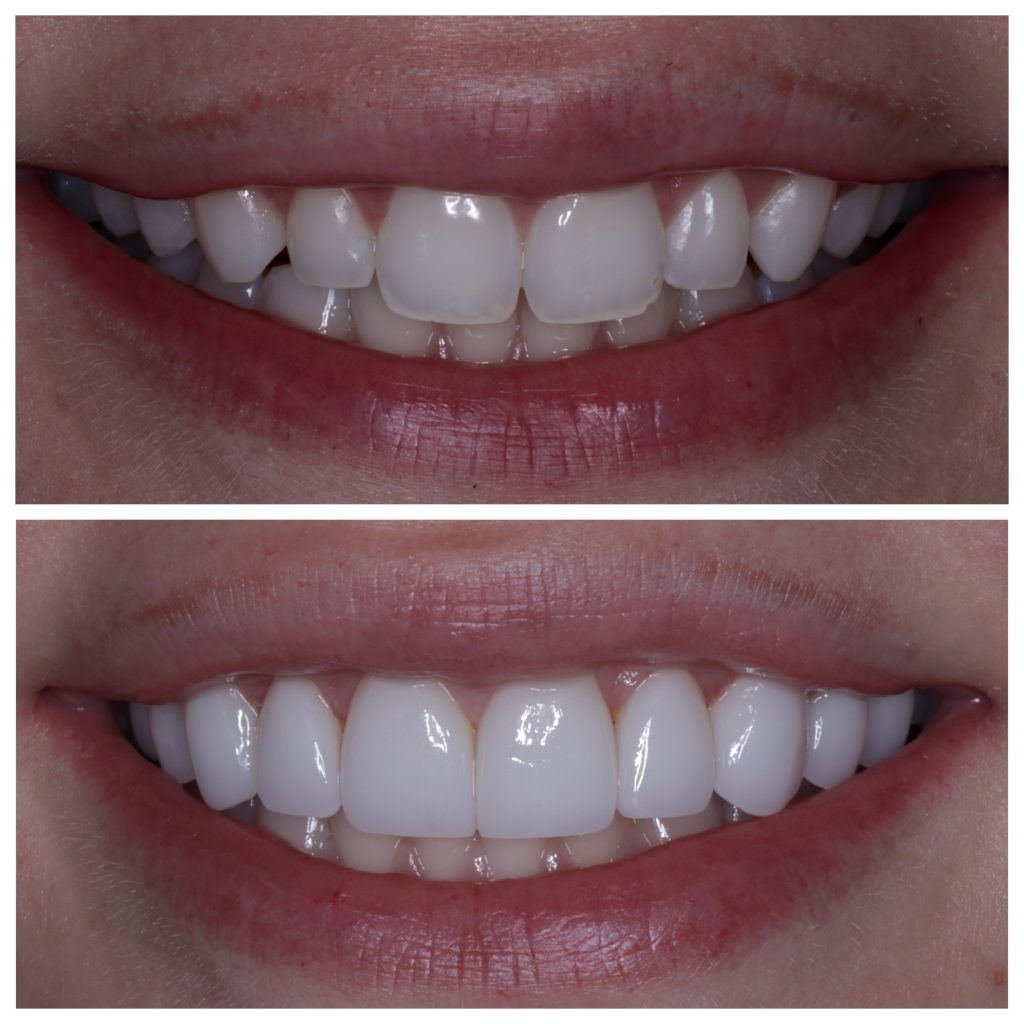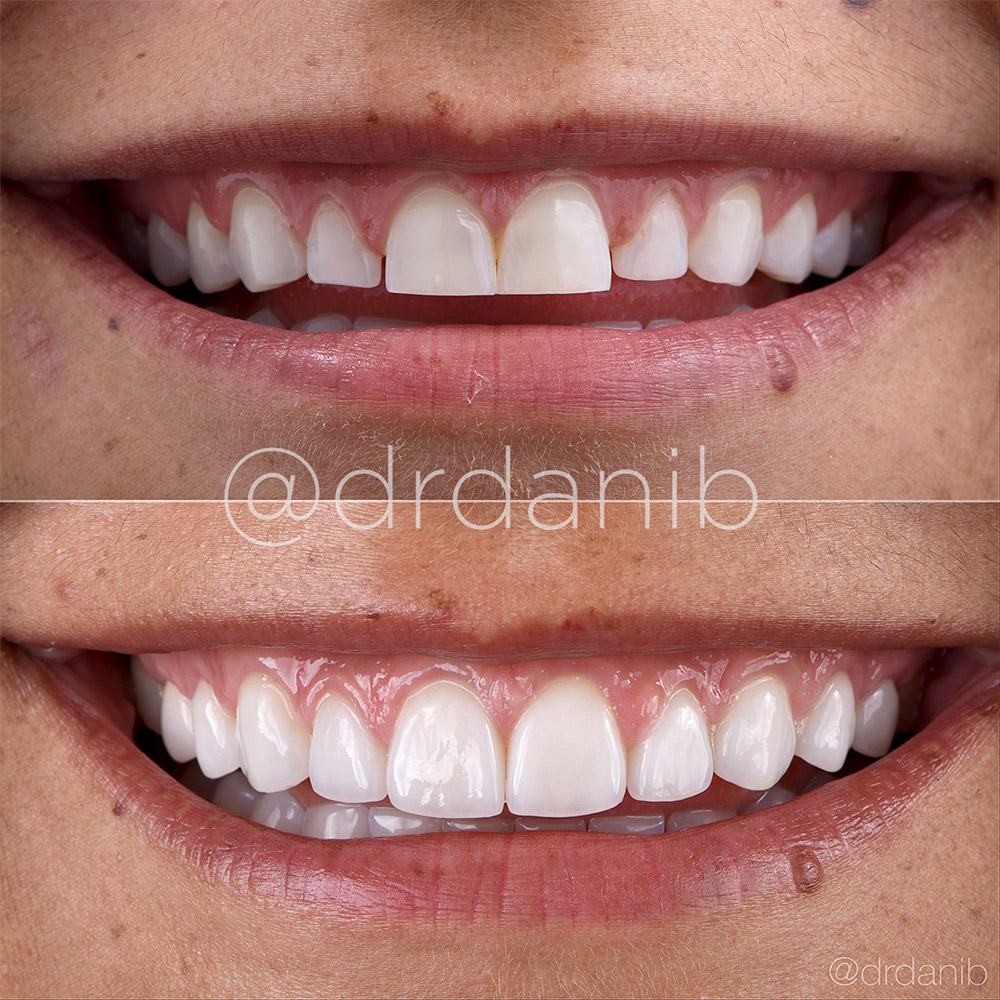Porcelain Veneers Dentist Explains the Complete Procedure
Wiki Article
Unlocking the Secrets of Veneers: Truths, Types, and Benefits for a Gorgeous Smile
Veneers use an engaging option for those looking for to improve their smiles. These oral enhancements can address numerous flaws, from discoloration to imbalance. With choices like porcelain and composite, people can select based on their preferences and demands. Recognizing the nuances of veneers, consisting of application and care, is essential. What elements should one think about before choosing? The responses may surprise those curious about this visual oral alternative.
Comprehending Veneers: What Are They?
Veneers are slim, custom-made shells designed to cover the front surface area of teeth, boosting their look. Usually crafted from durable products, these coverings are tailored to fit each individual's teeth exactly. They offer numerous functions, consisting of remedying visual flaws such as staining, chips, or spaces. The application process entails a dental practitioner preparing the teeth, usually by getting rid of a percentage of enamel to ensure a tight fit. Once prepared, the veneers are bonded to the teeth making use of a strong adhesive.Clients often pick veneers for their capacity to develop a natural-looking smile while offering a long-lasting solution to oral flaws. Unlike other cosmetic dental care options, veneers call for marginal invasive treatments, making them a preferred option. The result is a better smile that can considerably enhance an individual's confidence and self-worth. Generally, veneers offer an effective technique to accomplishing a much more appealing and unified oral look.
Kinds of Veneers: Porcelain vs. Compound
When considering cosmetic dental alternatives, two key kinds of veneers attract attention: porcelain and composite. Porcelain veneers are crafted from a durable ceramic material that simulates the natural appearance of teeth. They are recognized for their discolor resistance and ability to mirror light similarly to natural enamel, giving an aesthetic appeal that numerous people need. The application procedure typically entails more preparation of the tooth framework and might need several check outs to the dental practitioner.On the various other hand, composite veneers are made from a tooth-colored resin that is straight applied to the teeth. This type allows for quicker application and can usually be finished in a single browse through. While they are more economical than porcelain veneers, they may not offer the exact same durability or resistance to discoloration. Inevitably, the selection in between porcelain and composite veneers depends upon specific preferences, budget, and particular oral demands.
The Benefits of Choosing Veneers
Choosing veneers offers numerous benefits that can considerably boost both the visual appeals and capability of an individual's smile. One of the main benefits is their ability to remedy imperfections such as staining, spaces, and imbalance, leading to a much more uniform look. Veneers can also enhance the toughness of teeth, supplying a protective layer that shields them from damage.In addition, they require very little tooth preparation contrasted to various other oral treatments, preserving more of the all-natural tooth framework. This preservation adds to a healthier oral environment while still accomplishing a sensational smile.
Veneers are very adjustable, allowing people to pick the form, size, and shade that best matches their preferences. Furthermore, they are stain-resistant, making it easier to keep a bright and eye-catching smile gradually. In general, veneers provide an efficient alternative for those looking for both aesthetic improvement and long-lasting dental wellness advantages.
The Veneer Application Process
The veneer application procedure includes numerous crucial steps to assure ideal results. An appointment is conducted to analyze the patient's demands, adhered to by the prep work and shaping of the teeth. The veneers are bonded in location, with adjustments made for an ideal fit and appearance.First Assessment Tips
A thorough initial appointment is necessary for anybody taking into consideration veneers, as it establishes the structure for a successful therapy. Throughout this conference, the dental specialist reviews the individual's oral wellness, discussing any existing problems that might affect the veneer application. This assessment might consist of X-rays and a visual exam to figure out the problem of the gum tissues and teeth.The dentist additionally involves the person in a comprehensive conversation regarding their visual goals, preferences, and expectations. They might present numerous veneer choices tailored to the client's certain demands. Furthermore, the specialist describes the procedure, potential dangers, and aftercare requirements, making certain that the patient is knowledgeable and comfy prior to proceeding with the therapy.
Prep Work and Forming Teeth
After the preliminary assessment, the next stage entails the prep work and shaping of the teeth to fit the veneers. This vital action is carried out by the dental practitioner, who carefully analyzes the tooth structure to establish the quantity of enamel that requires to be eliminated. Usually, a thin layer, usually around 0.5 millimeters, is slashed off to guarantee a correct suitable for the veneers. Precision is extremely important during this process, as it impacts both the general convenience and the visual result. As soon as the teeth are properly shaped, impacts are taken to create customized veneers that straighten perfectly with the patient's oral account. This thorough prep my website work sets the phase for a successful veneer application, improving both look and function.Bonding and Final Changes
Complying with the shaping and preparation of the teeth, the bonding process begins, noting a crucial stage in the veneer application. Throughout this phase, a dental adhesive is put on the prepared tooth surface, assuring a solid bond in between the veneer and the tooth. The dental professional diligently positions the veneer, making adjustments to accomplish the desired placement and aesthetic appeals. As soon as effectively placed, an unique light is used to cure the sticky, strengthening the bond. After treating, the dentist conducts last modifications, trimming any kind of excess material and improving the veneer's form to guarantee an all-natural appearance. This mindful attention to detail improves both feature and looks, contributing to an overall beautiful smile that is resilient and sturdy.Caring for Your Veneers: Upkeep Tips
Caring for veneers is necessary to maintain their appearance and durability. A regular daily cleaning routine, mindful avoidance of staining foods, and routine dental examinations are key parts of reliable maintenance. These practices assist assure that veneers continue to be in peak problem and remain to enhance one's smile.Daily Cleaning Regimen
Consistently maintaining veneers is vital for their long life and appearance. A proper everyday cleansing regimen can aid maintain their luster and protect against damage. Dental experts advise brushing two times a day with a soft-bristled toothbrush and fluoride toothpaste, making sure that all surface areas are cleaned carefully to avoid scraping the veneer surface. Flossing day-to-day is also important to get rid of food bits and plaque from in between teeth, where brushes may not get to. Additionally, utilizing an antimicrobial mouthwash can aid preserve dental hygiene without hurting the veneers. It is advisable to avoid rough cleansers and tools that can scrape the veneer. By complying with these basic actions, individuals can maintain their veneers looking stunning while promoting overall dental health.Avoiding Discoloration Foods
Although veneers are made to boost the appearance of teeth, their susceptibility to tarnishing demands mindful nutritional choices. It is necessary for individuals with veneers to be conscious of Website specific foods and drinks that can lead to staining. Dark-colored things such as coffee, merlot, and berry juices must be eaten in moderation, as they are recognized to discolor both natural teeth and veneers. In addition, acidic foods like citrus fruits canister weaken the bonding agents utilized in veneers, making them a lot more vulnerable to staining. To keep an intense smile, it is suggested to wash the mouth with water after taking in discoloration foods and to exercise routine dental health. These thoughtful selections add substantially to the long life and aesthetics of veneers.
Routine Oral Examinations

Keeping the honesty of veneers needs a dedication to regular oral exams, as these visits play a crucial role in guaranteeing their long life and appearance. Throughout these brows through, oral experts continue reading this can assess the problem of the veneers, inspecting for any kind of signs of wear, damage, or underlying dental problems. Furthermore, regular cleanings aid eliminate plaque and tartar that can collect around the veneers, promoting general oral health. Dental professionals can additionally provide personalized recommendations on treatment strategies and items matched for veneer upkeep. By sticking to a schedule of check-ups, people can deal with possible problems early, guaranteeing their smile stays vivid and attractive. Eventually, regular dental sees are an essential component of veneer treatment.
Is Veneers the Right Alternative for You?
Making a decision whether veneers are the right option usually depends upon private dental needs and aesthetic objectives. For those looking for to resolve concerns such as discoloration, chips, or misalignment, veneers can provide a transformative service. Candidates typically include individuals with healthy teeth however desire an enhanced smile.
Nevertheless, it is important to consider variables such as tooth enamel problem, the degree of dental issues, and the readiness to keep veneers - Veneers Teeth. Consulting with an oral specialist is vital, as they can examine dental health and wellness and establish if veneers appropriate
Additionally, prospective candidates must reflect on the long-lasting commitment, as veneers might require substitute every 10-15 years. Price considerations additionally play a significant function, as veneers can be a significant financial investment. Eventually, the choice must be knowledgeable, balancing visual needs with useful considerations for long-term results.
Regularly Asked Questions
How Much Time Do Veneers Commonly Last Prior To Needing Substitute?
Veneers normally last between 10 to 15 years prior to requiring replacement. Elements such as oral hygiene, way of living selections, and material high quality can affect their long life, making normal oral exams vital for preserving their condition.Are Veneers Safe for People With Delicate Teeth?
Veneers can be secure for individuals with sensitive teeth, but it frequently depends on the extent of level of sensitivity and the dental practitioner's strategy. Consulting an oral expert prior to continuing is important to ensure ideal results.Can Veneers Be Eliminated or Changed Easily?

Do Veneers Spot Gradually, and Exactly How Can I Prevent It?
Veneers can stain in time, especially from foods and beverages like coffee or red white wine. To stop discoloration, keeping great dental health, making use of a straw for beverages, and normal dental cleansings are suggested practices.What Is the Price Range for Getting Veneers?
The cost of veneers typically ranges from $500 to $2,500 per tooth, depending upon aspects such as material kind, dental expert experience, and location. Patients need to seek advice from oral specialists for individualized quotes and funding choices.As soon as the teeth are appropriately formed, perceptions are taken to create custom veneers that line up completely with the client's dental account. Throughout this stage, a dental adhesive is used to the ready tooth surface, ensuring a strong bond in between the tooth and the veneer. It is crucial to take into account elements such as tooth enamel condition, the extent of oral issues, and the determination to maintain veneers. Veneers can be risk-free for people with sensitive teeth, but it frequently depends on the extent of sensitivity and the dentist's method. The price of veneers commonly ranges from $500 to $2,500 per tooth, depending on variables such as product kind, dental practitioner experience, and area.
Report this wiki page